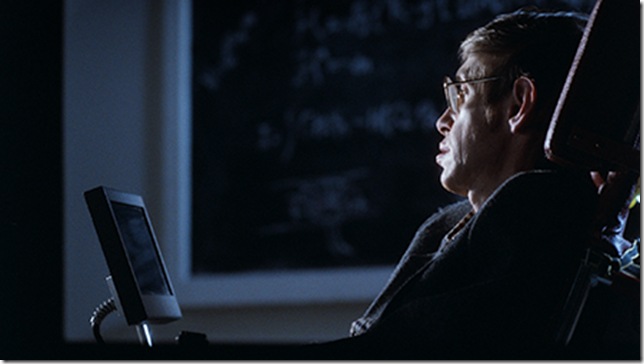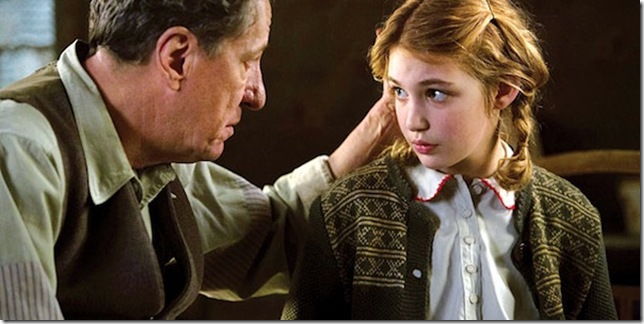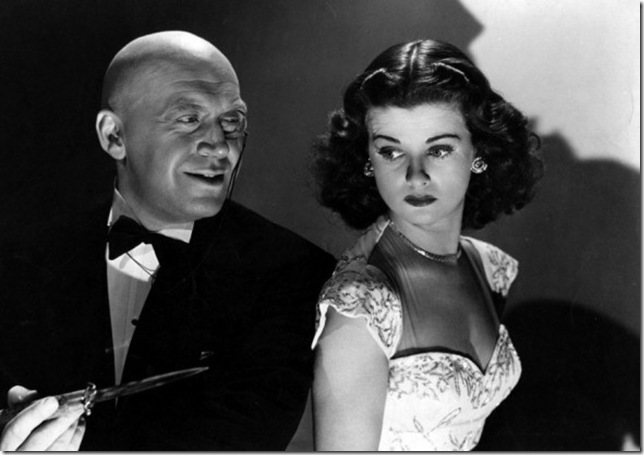A Brief History of Time: For years, Stephen Hawking’s A Brief History of Time has been sitting on my shelf, its spine ashamedly uncracked, waiting for the hypothetical day when I have hours of time on my hands and the irrepressible desire to read sentences six times before possibly comprehending them. Forgive me if I’d gallop a bit quicker toward completing an 84-minute movie version of the same source, directed by the best documentary filmmaker in the country.
With 1991’s A Brief History of Time (Criterion, $24.99 Blu-ray + DVD), Errol Morris manages to film the unfilmable, condensing Hawking’s life and theories into manageable, relatable chunks. The film is a constant tug of war between these two approaches — Hawking’s science and his biography — and like a theoretical universe that expands and contracts, Morris will spend several minutes lingering on such massive and unknowable questions as the beginning (and potential end) of the universe before spending the next segment back on Earth, informing us of the physical minutiae of living as Stephen Hawking, a man who types out his waterfall of thoughts one word, one click at a time.
Both grandiose and intimate, A Brief History of Time is a fount of ideas that remain as hotly debated in the 21st century as they were in the 20th, from black holes to quantum theory and the God question. In presenting them using Morris’ keen visual eye — a chicken clucks in the cosmos, an expensive watch drifts toward a black hole, a cup and saucer smash to the ground and then rebuild themselves — the film is an antecedent to TV’s Through the Wormhole, which similarly explores heady concepts with a laymen’s visual analogies.
Many of Hawking’s colleagues and family members share revealing anecdotes and scientific calculations with Morris, but it is, of course, Hawking himself who is the most compelling figure onscreen, transmitting personality, intellect and wit while barely moving a muscle — often in front of a Marilyn Monroe poster incongruously tacked onto the wall of the great scientist’s office. In an interview featurette included on the disc, Morris calls Hawking “the first non-talking talking head in the movies,” which is, indeed, another feather in this innovative director’s cap. A must-see for science enthusiasts and doc lovers alike.
Contracted: In this squeamishly unnerving shocker (IFC, $22.98 DVD) from the prolific cult horror director Eric England, Najarra Townsend plays aspiring florist Samantha, whose relationship with girlfriend Nikki (Stegeman) has reached an impasse. Drowning her frustration with a night of hard partying, she winds up date-raped by a blurry stranger. All of this happens before the film’s opening title; the rest of the movie is subtitled “Day 1,” then 2 and 3, as Samantha’s adverse reaction to her rape metastasizes into symptoms more disturbing than the worst STD: Think fountains of blood spilling from most of her orifices, varicose veins spiderwebbing throughout her body, fingernails and teeth rotting off her body — and whatever you do, don’t look into her eyes. In short, she’s fast becoming a living corpse.
Regrettably, Contracted is borne in part from the conservative slasher mentality of the Reagan era, where hedonistic lifestyles are gruesomely — but moralistically! — punished. Moreover, the extent that the rest of the movie’s world accepts Samantha’s decline with ambivalence or downright ignorance stretches credulity; at one point, the owner of the restaurant where she waits tables permits her to continue her job even after assessing her condition.
But at its best, Contracted resembles David Cronenberg’s bodily horror films of the ’70s and ’80s, lacking only his cool precision. This is one creepy, icky, uncomfortable movie with truly revolting special effects. You’ll want to take about 10 showers when it’s over, not to mention a vow of celibacy.
George Washington: David Gordon Green’s coming-age-of symphony George Washington (Criterion, $25.99 Blu-ray + DVD) is a debut feature of Orson Welles proportions, the sort of career apex most directors spend careers working toward. Released out of nowhere in 2000, this fable set in rural North Carolina centers on a group of poor children, mostly African-American, who face profound moral and ethical decisions after a bout of horseplay leads to the death of a friend (the accident, which befalls a central character a third of the way into the film, reverberates with the bold narrative echoes of Psycho and L’avventura). They cover up their misdemeanor, which, for two of the kids, only leads to festering guilt, regret, momentous self-reflection and misguided decisions; for the other child, it leads him toward a path of heroism.
Green’s astonishing dialogue as well as his symbolically laced mise-en-scène are part naturalistic, part mystically stylized, resulting in a singular hybrid that transcends the countless low-budget indies about people on life’s margins. The children are old souls, and the actors’ performances are fittingly mature — arresting in their unguarded directness. The most prominent character, however, may be the landscape itself, the ruins of an erstwhile industry town defined by paint-stripped walls, weeds that sprout over rickety railroad tracks and endless construction projects.
Green has directed some quality works since George Washington —a nd also some asinine studio comedies, which is akin to a master artist turning to corporate logos — but never anything as blazingly inspired as this first feature. Criterion has finally provided a studious collection that does the work justice, packaging Green’s first two student shorts, an old Charlie Rose interview, and interviews with cast and crew among its choice supplements.
The Book Thief: The story of World War II horror told through the eyes of a precocious orphan child named Liesel (Sophie Nélisse) is exactly what you’d expect from Brian Percival, whose directorial credits include Downton Abbey and Masterpiece Classic: A handsome, self-contained, rather clinical costume piece in which everything is proper and in order (Fox, $19.99 Blu-ray, $14.99 DVD).
Even the fresh corpses dug up from the rubble of a decimated residential street look well-groomed and made up to the nines, with PG-13 scratches and scuffs, barely squeezing out the words “I love…” on their impromptu deathbeds. It’s unashamedly maudlin stuff lorded over not by Percival but by John Williams, who received another de riguer Oscar nomination for his grandiose music, swathing the production with simplistic emotional cues.
The best part of The Book Thief, and I’m probably just betraying my profession and my irrepressible Scrabble habit here, is its intoxication with language; sold off to couple in Germany in the run-up to the Second World War, Leisel opens the film illiterate and learns English (not German, so the subtitle-phobes can rest assured) by thieving novels from the library of a fascist official, and she remembers words by scrawling them on an increasingly busy chalkboard in her basement.
She also bonds with three important males in her life — her kindly adoptive father (Geoffrey Rush), a local boy with Olympic aspirations (Nico Liersch) and a Jewish runaway concealed in her home (Ben Schnetzer). Like Jean-Pierre Jeunet’s A Very Long Engagement, it’s all a bunch of manicured pageantry that’s far too beautiful —what Truffaut would call a Tradition of Quality picture — to accurately represent war.
Margin For Error: Released in 1943, Otto Preminger’s Margin for Error (Fox Cinema Archives, $19.98 DVD) took its story from a 1939 play by Clare Booth Luce, a domestic drama written prior to the U.S. involvement in World War II. Originally seen it was, some two years after Pearl Harbor, the film functions as an unabashedly positive anti-Nazi morale-raiser for the home front.
Milton Berle plays wisecracking New York City cop Moe Finkelstein, who is given the unenviable position of protecting crooked German consulate general Karl Baumer (Preminger), when he’d rather see the whole lot of Nazis fall on their swords. Other key players include Sophia (Joan Bennett), the consul’s loveless wife, and Baron Max von Alvenstor, his deputy, whose Nazi leanings will be put to the test.
For a film with as noirish a title as Margin for Error, this relative quickie (74 minutes) could have used some chiaroscuro menace and a few panicked chases down poorly lit boulevards. It never sheds its talky origins, though much of the screenplay, adapted by Lillie Hayward, is colored by a dark, sardonic and agreeable wit concerning manners of monumental gravity. Preminger was still developing his style as a director, and even this propagandistic B-picture is shot with care and attention to detail; note the scenes, oozing menace, in Baumer’s office, where a bust of Hitler is positioned in between dueling characters, literally coming between them.
Mostly, though, Preminger’s best contribution to this picture is his acting; as the placid arch-villain, he clearly gave himself the choicest part, and his performance is imbued with wicked intelligence.




